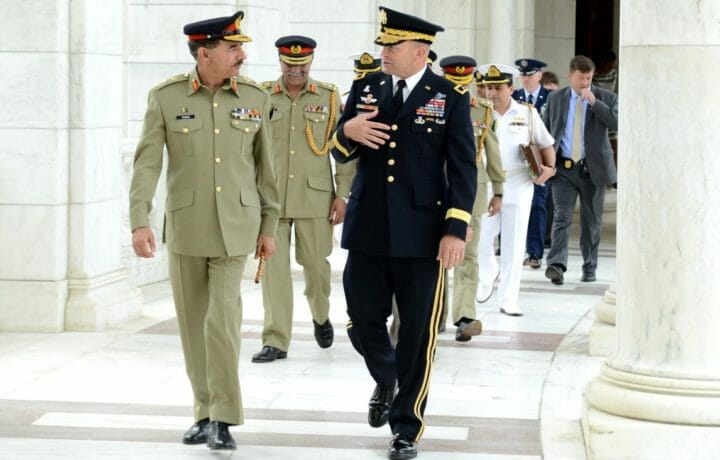Prime Minister Imran Khan, who famously celebrated the NATO withdrawal from Afghanistan and the Taliban-Haqqani takeover of the country, has found himself pushed out of power. Opposition forces in parliament have been pressing for Khan’s removal, claiming he is at fault for the continuing economic crisis and that he is simply not good at running the government. In early March the opposition started procedures to hold a no-confidence vote, but that has so far been held off. Khan is fighting for his life as some in his own party have abandoned him and he appears to be losing the Pakistan Army.
There is a poor track record of government power being handed over in normal ways in Pakistan. That plays a role in the current unfolding drama. Since its creation in 1947 Pakistan has had 30 prime ministers and many of them have not kept power long.
After the founding leader (Governor General) died in office, the first prime minister was assassinated. The next two prime ministers were fired. In the 1950s and 60s a few leaders resigned, and one was banished. In 1971 the prime minister was assassinated, and in 1988 the general who had led the previous coup d’état was assassinated too. The next prime minister was fired twice and later assassinated. The next was fired, later resigned after their re-election, and was then banished in another coup d’état. The general that had ousted him was also later fired and exiled from the country. The prime minister Pakistan banished, then returned to win another election, only to be removed from power again by the supreme court for corruption, and then sentenced to prison. The longest serving prime minister has a 10-year jail sentence, and only served 9 years total.
The army has played an unusually large role in Pakistani politics for decades. Besides leading a few coup d’états, they have also been a power house in manipulating election issues, manipulating the press, and establishing a foreign policy that is heavily rooted in national security issues. Prime Minister Imran Khan appears to have lost the support of some army leaders over Khan’s inability to keep relations with the United States in good form. While the army was supporting terrorists that were killing U.S. servicemembers from 2001-2021, the army also demanded their political leaders keep relations smooth with the U.S. and that American money continue to flow to the Pakistani army.
Khan’s open Islamist populism approach to staying in power has earned him lots of support across the country, but DC policymakers have been growing wiser to Pakistani duplicity on terrorism and it is worrying the Pakistani Generals. On April 2 General Bajwa, the Pakistani army chief discussed the “long history of excellent relation[s] with the United States,” and publicly took a dig at the prime minister by stating that strong relations with the U.S. are “vital” to Pakistan’s national interests. Khan has failed to get his ambassadors in DC into the right meetings, and had a very prickly reception from both Trump and Biden. Biden has refused to even have a phone call with Khan.
What comes next for Pakistan and US
The Pakistani army seeks to have their cake and eat it too, and other nations have taken notice. While the Pakistani army wants to get Pakistan off the Financial Action Task Force (FATF) Grey List due to their terrorism support, they can’t seem to stop their efforts to aid the Taliban-Haqqani network in Afghanistan.
The Pakistan army will likely flex their muscles to help find a new leader that can turn around the relationship with the U.S., despite army support for U.S.-designated terrorist groups. Although in 2020 two Pakistani generals at a CENTCOM conference in a fit of anger exclaimed that China is a better friend to Pakistan than the US, they are having some buyer’s remorse now.
The Chinese, who Pakistani generals once called a better friend than America, because China does not lecture Pakistan about human rights and democracy, are not great craftsmen. Many of the large pieces of military equipment like tanks, artillery, and anti-aircraft weapons are often defective and can’t be used as they were promised. The continuing Grey Listing for terror support means that Pakistan is stuck with shoddy Chinese deals and equipment, because the U.S. and some European nations are unable to sell Pakistan their equipment.
Pakistan’s generals know that if this continues their ability to fight India will decrease. Now we will see how far the military is willing to go to find a better leader, that can somehow smooth over their relations with the West. Unfortunately, it is unlikely that Pakistan’s army will be willing to give up support to terrorism to make it happen.




